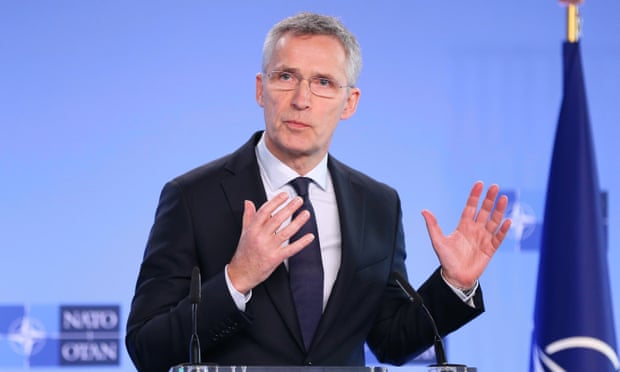Nato allies will consider strengthening Ankara’s air defences in response to the strike that killed 33 Turkish troops in rebel-held Syria, following an emergency meeting of the military alliance in Brussels on Friday.
Turkey had also called for western countries to establish a no-fly zone after the incident but Nato sources stressed that idea – which could lead to direct conflict with the Russian air force – was not seriously discussed.
Jens Stoltenberg, the organisation’s secretary general, said that members of Nato expressed their “full solidarity” with Turkey in the aftermath of the attack, which took place in Idlib, the last part of Syria outside Bashar al-Assad’s de facto control.
But Stoltenberg offered no immediate promise of assistance to Ankara, saying instead in the aftermath of the meeting that Nato members were “constantly looking into what more they can do to provide further support for Turkey”.
Sources said this would most likely mean strengthening Nato’s existing reconnaissance mission over the country and building on the Patriot air defense system run by Spain. The US has previously said it would only supply similar equipment directly if Turkey ditches plans to deploy a rival Russian S-400 system.
The urgent talks on the crisis were held on Friday after Turkey requested a rare emergency meeting of members under article 4 of the alliance’s governing treaty, on the grounds that its security was under threat.
Turkish officials blamed the Syrian regime for the major attack on its troops, which were deployed earlier this month to bolster rebel groups Ankara supports against the regime campaign.
However, several sources in Idlib and unverified footage of the night-time strike suggested it had been carried out by the Russian air force, which has helped Damascus conduct a ferocious three-month offensive on the province.
President Recep Tayyip Erdoğan’s communications director, Fahrettin Altun, said Turkey had retaliated by hitting Damascus regime targets “from the air and ground”. Drone footage released by the Turkish military of the response showed blistering attacks on tanks, howitzers and soldiers.
The retaliatory attacks destroyed five Syrian military helicopters and two air defence systems, and “neutralised” 309 Syrian regime soldiers, said defence minister Hulusi Akar, without providing evidence. A war monitor said at least 20 Syrian troops had died in the counterattacks.
One Turkish soldier was killed and another wounded in a fresh artillery fire by the Syrian regime on Friday.
Adding to the volatile situation, Moscow sent two warships, the Admiral Makarov and Admiral Grigorovich, both capable of firing Kalibr cruise missiles, from the Black Sea to the Mediterranean waters off Syria on Friday. They moved through the Bosphorus strait, which is governed by an international treaty, sailing through the heart of Istanbul.
Almost a million people have been displaced and driven north to the Turkish border by the regime campaign on rebels and jihadist factions, making the battle for control of Syria’s last opposition stronghold the worst humanitarian crisis in the war to date.
Thursday’s deadly bombardment has added to weeks of growing tensions between Turkey, a supporter of some Syrian rebel groups and a Nato member, and Moscow, which is allied with Assad.
The UN security council held emergency talks on the escalation of fighting on Friday, requested by the US, Germany, Britain, France, Belgium, Estonia, and the Dominican Republic – some of which have stated publicly that they support Turkey.
Russian Ambassador to the UN Vassily Nebenzia told the council Moscow is “ready to de-escalate with anyone” in the battleground Idlib region and reiterated that Moscow “had not participated in the attacks.”
In a telephone call with the Russian president, Vladimir Putin, Erdoğan said Syrian government troops and allied forces remained legitimate targets for Ankara. The Kremlin said it agreed on the need for a new arrangement to avert clashes in Idlib. Turkey said the leaders agreed to meet as soon as possible.
Turkey said Erdoğan had also discussed the crisis with the US president, Donald Trump, and the German chancellor, Angela Merkel, earlier on Friday. The chancellor’s spokesperson said she “condemned the ruthless attacks on Turkish troops”.
US secretary of state Mike Pompeo described Thursday’s attack as “despicable and brazen” and said the US was “reviewing options to assist Turkey against this aggression as we seek to prevent further Assad regime and Russian brutality and alleviate the humanitarian suffering in Idlib”.
There was no immediate confirmation from Damascus of the reported troop deaths or any comment on the flare-up with Ankara.
The UN said the latest fighting in Idlib was coming “dangerously close” to encampments of the displaced, risking an imminent “bloodbath”. Turkey, which is already home to millions of Syrian refugees, fears more people will attempt to cross its closed southern border.
Thursday’s attack brought to 53 the number of Turkish security personnel killed in Idlib this month. Elsewhere on Thursday, jihadists and Turkish-backed rebels re-entered Saraqeb, a key crossroads town they had lost earlier in February, reversing one of the main gains of the government’s devastating offensive.
The counter-offensive could be short-lived, however, as Syrian troops backed by Russian airpower continued to chip away at other parts of the rebel bastion, capturing 20 localities.
Seven civilians, including three children, were killed in regime and Russian bombardment of Idlib on Friday, according to the Syrian Observatory for Human Rights, adding to more than 400 such deaths since December.








































admin in: How the Muslim Brotherhood betrayed Saudi Arabia?
Great article with insight ...
https://www.viagrapascherfr.com/achat-sildenafil-pfizer-tarif/ in: Cross-region cooperation between anti-terrorism agencies needed
Hello there, just became aware of your blog through Google, and found ...